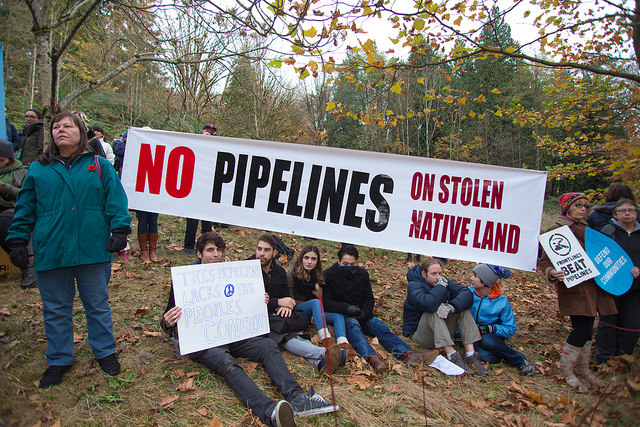Canada News
No suitors emerge for pipeline project stake as Kinder Morgan deadline looms

FILE: With just over a week remaining until the May 31 deadline set for abandoning its Trans Mountain pipeline expansion, no suitors have publicly emerged to step into builder Kinder Morgan Canada Ltd.’s shoes. (Photo by Mark Klotz/Flickr, CC BY 2.0)
CALGARY — With just over a week remaining until the May 31 deadline set for abandoning its Trans Mountain pipeline expansion, no suitors have publicly emerged to step into builder Kinder Morgan Canada Ltd.’s shoes.
Analysts and observers say they remain perplexed by Finance Minister Bill Morneau’s comment last week that “plenty of investors would be interested in taking on this project,” after the federal government said it would offer an “indemnity” or insurance to guarantee it is built.
Kinder Morgan said Monday it has nothing to add to last week’s statement from CEO Steve Kean in which he repeated the May 31 deadline and said that discussions are ongoing but “we are not yet in alignment.”
It’s difficult to guess who might take Kinder Morgan’s place without knowing what guarantees or deals are being offered by the federal government and possibly the province of Alberta, said Samir Kayande, a director with RS Energy Group in Calgary.
He pointed out that the richer the deal, the longer the list of potential replacements for Kinder Morgan, which could include pension or private equity funds.
“There is still time to get something done around a guarantee of some sort that will satisfy Kinder Morgan,” he said in an interview on Monday.
“It really depends on the scope of the federal and provincial guarantees that are going to be offered. The governments are in kind of a tough spot here because if anyone does step in, it’s going to take them months or longer, potentially, to ramp up the whole effort.”
The federal government has said its indemnity and suggestion of the entry of a third party gives it an advantage as it negotiates with Kinder Morgan but Dennis McConaghy, a former TransCanada Corp. executive and industry analyst, said he disagrees.
He said it would be a “political disaster” for both Morneau and Alberta Premier Rachel Notley if the pipeline in-service date is delayed beyond 2020 because both governments have staked their reputations on it being built.
“I’ve been very skeptical about the advent of third parties,” said McConaghy. “This deal has to get done with Kinder if the focus is to get the pipeline in service by 2020.
“This project is essentially an expansion and a debottlenecking of an existing pipeline so it’s very difficult to build the project without selling the original Trans Mountain asset, which is of course a very complicated prospect.”
He said the cost and delays involved in bringing in a third party makes it clear that the federal government’s best bet is to reach an agreement with Kinder Morgan.
Meanwhile, finance officials had no new details to report in an email received Monday.
Trans Mountain has been operating since the 1950s, carrying as much as 300,000 barrels a day of oil and refined fuels from Edmonton to the Vancouver area, where it connects with a line carrying crude to refineries in Washington state.
The planned tripling to 890,000 barrels a day could give Canada access to alternative markets as booming production from U.S. shale plays reduces Canada’s biggest customer’s need to import northern oil.
B.C. is fighting the pipeline in the federal Court of Appeal and in B.C. Supreme Court. It has also referred to the B.C. Court of Appeal its own proposed legislation to cap oil shipments across the province.
Enbridge Inc., North America’s biggest crude pipelines operator, has denied it is negotiating to take over the Trans Mountain expansion project. Rival pipeline company TransCanada Corp. didn’t respond to a request for comment on Monday.
Oilsands producer Cenovus Energy Inc., a company hit hard by oil price discounts in the first quarter and a committed shipper on the project, refused comment when asked if it is interested in buying a stake in the project.
Kinder Morgan says it has already spent $1.1 billion of estimated $7.4 billion price of the project.





















